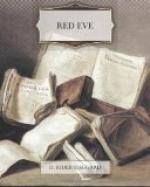Sir John rode to the Preceptory and hammered fiercely on its oaken door. Presently it was opened by Sir Andrew Arnold himself, who stood in the entrance, grey and grim, a long sword girt about his loins and armour gleaming beneath his monkish robe.
“What would you, Sir John Clavering, that you knock at this holy house thus rudely?” he asked.
“My daughter, priest, who, they say, has sheltered here.”
“They say well, knight, she has sheltered here beneath the wings of St. Mary and St. John. Begone and leave her in peace.”
“I make no more of such wings than if they were those of farmyard geese,” roared the furious man. “Bring her or I will pluck her forth.”
“Do so,” replied Sir Andrew, “if you live to pass this consecrated sword,” and he laid his hand upon its hilt. “Take with her also the curse of the Mother of God, and His beloved Apostle, and that of the whole Church of Christ, by me declared upon your head in this world and upon your soul in the world to come. Man, this is sanctuary, and if you dare to set foot within it in violence, may your body perish and your soul scorch everlastingly in the fires of hell. And you,” he added, raising his voice till it rang like a trumpet, addressing the followers of Sir John, “on you also let the curse of excommunication fall. Now slay me and enter if you will, but then every drop of blood in these veins shall find a separate tongue and cry out for vengeance on you before the judgment seat of God, where presently I summon you to meet me.”
Then he crossed himself, drew the great sword, and, holding it in his left hand, stretched out his right toward them in malediction.
The Clavering men heard and saw. They looked at each other, and, as though by common consent, turned and rode away, crossing themselves also. In truth, they had no stomach for the curse of the Church when it was thundered forth from the lips of such a monk as Sir Andrew Arnold, who, they knew well, had been one of the greatest and holiest warriors of his generation, and, so said rumour, was a white wizard to boot with all the magic of the East at his command.
“Your men have gone, Sir John,” said the old priest; “will you follow them or will you enter?”
Now fear drove out the knight’s rage and he spoke in another voice.
“Sir Andrew, why do you bring all these wrongs upon me? My boy is dead at the hand of Hugh de Cressi, your godson, and he has robbed me of my daughter, whom I have affianced to a better and a nobler man. Now you give her sanctuary and threaten me with the curse of the Church because I would claim her, my own flesh and blood; ay, and my heiress too to-day. Tell me, as one man to another, why do you do these things?”
“And tell me, Sir John Clavering, why for the sake of pelf and of honours that you will never harvest do you seek to part those who love each other and whom God has willed to bring together? Why would you sell your child to a gilded knave whom she hates? Nay, stop me not. I’d call him that and more to his face and none have ever known me lie. Why did you suffer this Frenchman or your dead son, or both of them, to try to burn out Hugh de Cressi and Red Eve as though they were rats in rubbish?”




